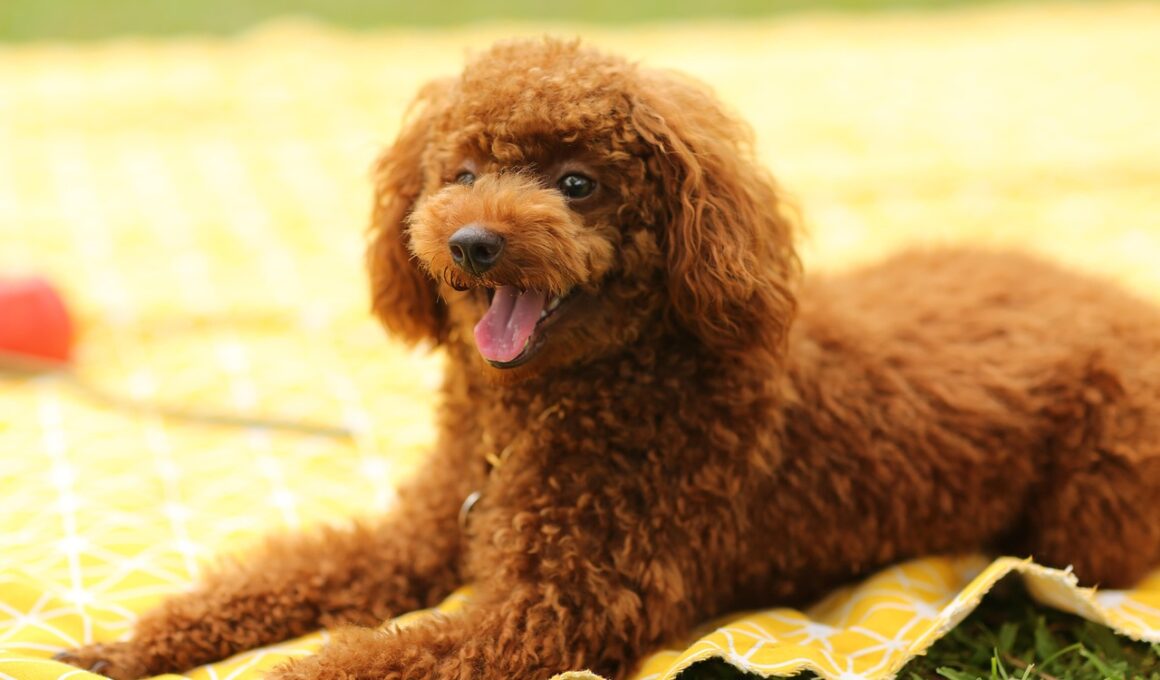Socializing Your Poodle: Tips for Early Puppy Classes
Socializing your Poodle is an essential part of their development. During their formative months, puppies are rapidly learning about their environment and how to interact with other dogs and people. The first few weeks of a puppy’s life are crucial. Early socialization helps them grow into well-adjusted adult dogs. Without exposure, a Poodle may develop fear or aggression towards unfamiliar situations and individuals. Early puppy classes can provide a controlled environment for your Poodle to explore and learn important skills. It is important to choose the right class tailored to the needs of your Poodle. Look for classes that offer a variety of social experiences, including meeting other puppies and adults. This helps build their confidence and reduces anxiety. Additionally, ensure that these classes incorporate positive reinforcement methods. Such techniques are effective in creating positive associations with new experiences in your Poodle’s early life. Doing so is essential for fostering good behavior as they grow. Training sessions should be fun yet structured to enlighten your Poodle amidst peers and human handlers.
One of the most critical aspects of training your Poodle puppy is the focus on positive experiences during classes. When preparing for classes, bring along your Poodle’s favorite treats or toys. This can help enhance their motivation and focus during training. However, it is crucial to ensure that these items do not become distractions. Maintain a balance between engaging your Poodle while ensuring that they remain attentive to instructions. Positive reinforcement encourages desirable behaviors, and offering rewards upon their successes can lead to more effective training. During early puppy classes, allow your Poodle to interact with a variety of other dogs. Each dog possesses different temperaments, and these interactions help prepare your Poodle for real-world situations. Socialization should include both calm and energetic dogs to ensure they adapt to various personalities. Moreover, experiences should extend beyond just dog-to-dog interaction. Encourage your Poodle to meet different people, including children, seniors, and individuals of varying appearances. This exposure helps to prevent any alarming reactions towards unfamiliar people in the future.
The Importance of Early Socialization
A significant emphasis should be placed on understanding why socialization is vital for your puppy. Poodles, like many breeds, are inherently social and develop strong bonds with their families. Proper early socialization minimizes the chances of behavioral issues, such as fear-based reactions and aggression, which can emerge without adequate exposure to stimuli. The first few months are termed the “sensitive period” in canine social development. During this time, puppies are particularly receptive to new experiences. You should strive to introduce your Poodle to diverse settings, sounds, and smells. Visited parks, playgrounds, or even pet-friendly stores can provide excellent opportunities for exposure. These encounters should be positive experiences to foster your Poodle’s eager attitude towards life. Early exposure should include both urban and rural environments so your Poodle learns to adapt to various situations. A well-rounded social background can aid in creating emotional resilience, reducing anxiety when facing new challenges later on. Socialize your Poodle frequently for a well-adjusted adult dog who can charm everyone they meet.
Additionally, consider enrolling your Poodle in training classes where professional trainers can provide guidance on effective methods. Professional trainers can tailor their approaches to match your Poodle’s individual temperament and needs. Look for trainers who utilize gentle, scientifically backed methods, ensuring they promote a healthy training environment. Early classes can also serve as an excellent bonding experience between you and your Poodle. Engaging together in activities helps build trust and understanding. An ongoing relationship of mutual respect will improve communication and training effectiveness as your Poodle matures. During classes, aim to focus on basic commands like “sit,” “stay,” and “come” to form a solid foundation. These skills not only enhance safety but also encourage good behavior. Training should always be an enjoyable experience filled with positive interactions. If your Poodle struggles, be patient and adjust the methods you use until they respond naturally. Remember that each puppy learns at its own pace, and adapting your techniques can foster better progress during classes.
Managing Fear and Anxiety
While socialization is crucial, it is equally important to monitor your Poodle for signs of fear or anxiety during interactions. Every puppy has its comfort zones, and pushing them too hard may backfire. Be attentive to their body language, noting any signs of stress, such as whining or withdrawal. If your Poodle displays discomfort, practice gradual desensitization techniques by reducing the intensity or duration of exposure to new situations. Take breaks between encounters and reassure your puppy with calm words. This allows them to process and feel safe. Encourage positive experiences by rewarding them when they interact calmly with new people or situations. Slowly exposing your Poodle to various situations helps them develop coping mechanisms to deal with fears. Avoid situations that could overwhelm your Poodle; Let them explore at their own pace. Through understanding and patience, you will build a supportive environment where your Poodle can thrive. Recognizing their boundaries is imperative during the socialization phase to create an emotionally healthy adult Poodle.
As classes progress, you might want to introduce group play sessions outside the structured environment. These informal gatherings allow your Poodle to engage with peers in a relaxed atmosphere. Social play is pivotal in asserting canine hierarchy and interpersonal skills among dogs. Monitor the sessions for any signs of dominance or aggressive behavior and intervene if necessary. Allowing your Poodle to navigate these dynamics is a valuable part of their learning experience. Facilitate playdates with trusted friends’ dogs, especially those that have complementary energy levels and play styles for best results. Having a consistent schedule for these encounters promotes regular socializing opportunities. Be sure to maintain an upbeat tone during play. This positivity helps reinforce the enjoyable nature of social interactions for your Poodle. Moreover, adapting these play scenarios outdoors will expose your Poodle to varying environments, sounds, and odors, thus enriching their overall experience. Remember always to keep a close eye on the dynamics and adapt as necessary to ensure tailored social experiences that cater to your Poodle’s comfort and growth.
Consistency is Key
Consistency in training and socialization is vital for your Poodle’s development. Regular exposure to various environments, individuals, and other dogs will help establish a standard that your Poodle will become accustomed to over time. Commit to ongoing training beyond initial classes, as continued education builds on your Poodle’s foundation. Each experience reinforces the behaviors you wish to encourage or modify. Create a structured routine that includes daily training sessions and social opportunities to aid in this endeavor. Engaging your Poodle in routine walks allows them to explore their neighborhood while encountering other dogs and various stimuli. Utilize these outings as training opportunities by practicing commands amidst distractions. Avoid overwhelming experiences by keeping these encounters organized and gradually introducing new challenges. Over time, your Poodle will build confidence in different scenarios, leading to a well-rounded and sociable adult. Consistency helps promote stability and predictability, which are essential for a harmonious relationship. This reliability in training allows your Poodle to flourish, fostering healthy bonds with family members and friends.
In conclusion, the early socialization of your Poodle is a cornerstone of their development. Fostering positive experiences through early puppy classes, playdates, and exposure to different environments ensures your Poodle matures into a well-mannered adult dog. Understanding the signs of your puppy’s comfort and discomfort levels is critical when navigating their socialization journey. Positive reinforcement and consistent training create a solid foundation for desirable behavior, while varied interactions prepare them to face challenges in adulthood. Balancing structured learning with playful experiences is essential for engendering a love of socialization in your Poodle. With a thoughtful approach to engagement, your Poodle will learn to thrive in diverse situations throughout their life. Investing time and effort in socialization during their formative months sets the stage for a lifelong companion, free from fear and anxiety. Continue nurturing your relationship through ongoing training and experiences, ensuring your Poodle remains confident in their skills. With dedication, your Poodle can achieve a fulfilling social life filled with wonderful memories.


